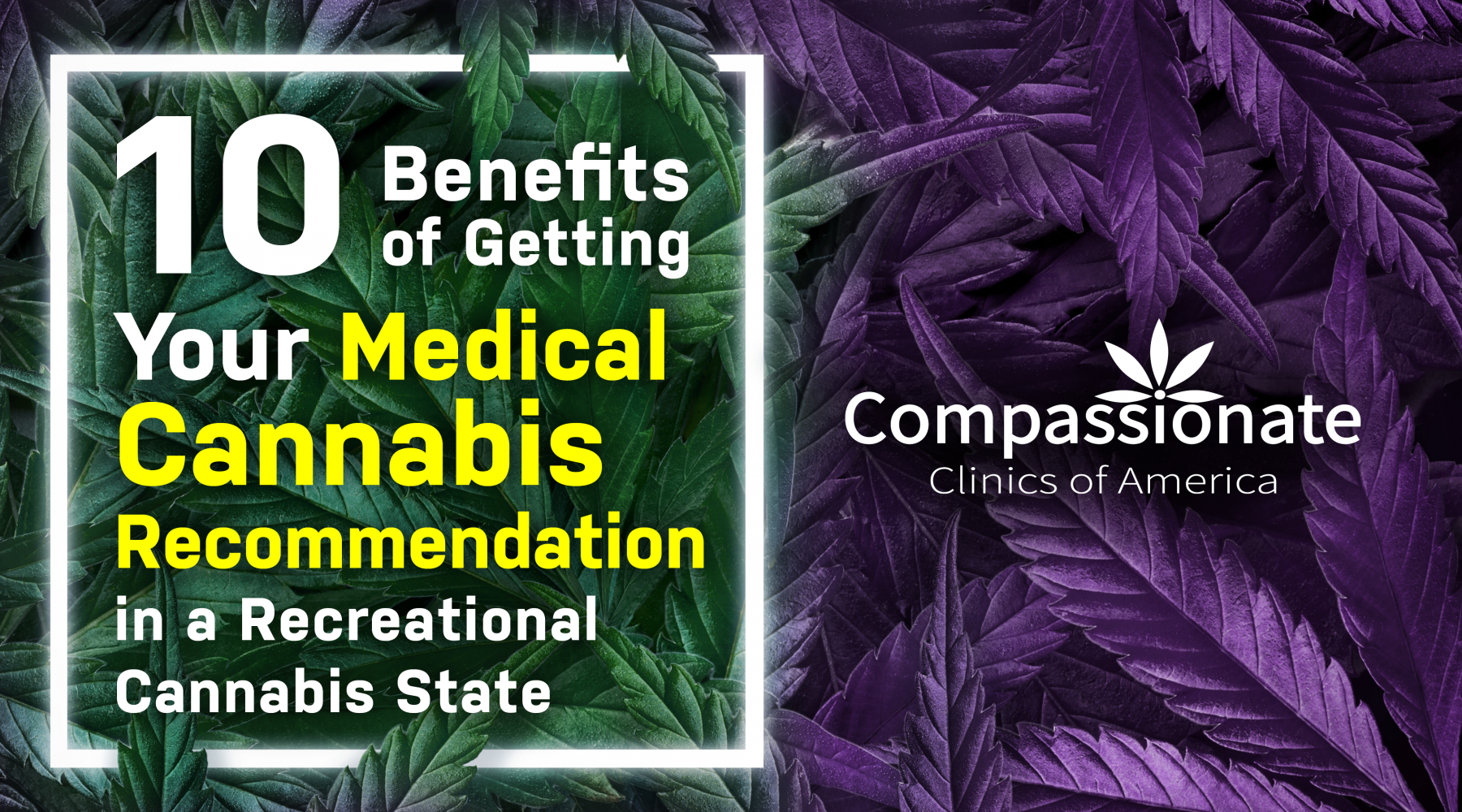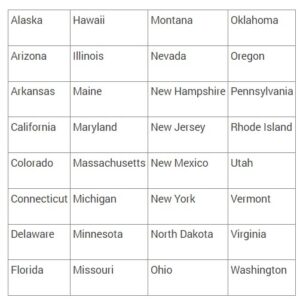10 Big Benefits of Getting Your Medical Cannabis Certification in a Recreational Cannabis State

We are seeing more cannabis reforms making it onto state ballots as more states realize the social, economic, and health benefits of allowing safe access to cannabis.
The cannabis community is hopeful for eventual federal cannabis reform, making the plant legal across the nation, but hopes for that have been dwindling since there have been no real moves from the Biden administration that hint towards federal legalization.
As the movement towards recreational cannabis legalization continues, strong pockets of advocates are working to protect medical cannabis, or medical marijuana programs, recognizing that medical patients benefit far greatly when sourcing their cannabis from medical cannabis dispensaries than at recreational dispensaries.
If you’re a patient who is living in a legal recreational state, and wondering “what’s the use?” of holding a medical cannabis card, or wondering “is there really a difference between medical and recreational weed?”, we’re urging you to hold on to that medical cannabis certification and keep it up to date for several reasons. Here’s why:
There are several ways that obtaining your medical cannabis certification and having your medical cannabis card acts as legal protection, whether you’re in a strictly medical state or a state that is both medical and recreational.
Generally speaking, holding your medical cannabis card provides you exemptions from certain laws pertaining to possession, possession limits, and home cultivation. Your medical cannabis card is a document that is certified by the state, and signed by a doctor, that indicates that you have legal protection under your state’s medical marijuana program.
In terms of your employment, holding a medical marijuana certification adds medical validity to your use of plant medicine. While some workplaces forbid use of all forms of marijuana, namely those that operate heavy machinery or equipment, many states have laws and guidelines that protect medical marijuana users in their employment situation should concerns arise.
Similarly, holding a medical cannabis card provides protection for parents going through custody disputes, as cannabis use and acquisition is done legally and under the supervision of medical professionals.
A 2020 study looked at the potency levels of cannabis found in states that had both medical and recreational cannabis dispensaries. While the study showed that there was generally no difference in potency levels of products, meaning that there is just as much (if not more) THC in recreational products than in medical products.
However, the study did show that medical dispensaries choose products based on their medical efficacy, not necessarily what has the highest THC.
Thus, when a patient is visiting a medical cannabis dispensary, they are likely to get more targeted recommendations on their medical treatment, guiding patients not necessarily to products with the most THC, but the products that integrate the therapeutic potential of terpenes, which affects medical cannabis outcomes.
3. Increased Support at Medical Cannabis Dispensaries
Medical cannabis dispensaries generally have medical professionals on staff that guide budtenders on helping patients find the right products, or consult directly with patients for their cannabis needs.
These medical professionals have studied cannabis in order to understand what cannabinoids and terpenes work best for certain medical conditions and will make product choices based on that.
In addition to this, medical cannabis dispensaries will have literature available on their websites about cannabis for specific medical conditions. As recreational dispensaries are not authorized to discuss medical conditions or cannabis in a medical context, you won’t find this kind of targeted information anywhere but at your local medical dispensary and on their website.

While states generally have different taxation policies on their marijuana products, in most cases, recreational and medical marijuana are not taxed at the same rate for the consumer.
Most states will have consumers paying an excise tax, which is a tax put on various goods and services, however, recreational marijuana is generally taxed at a higher rate, while medical marijuana has a lower excise tax or in some cases, no excise tax is applied at all.
For instance, in Illinois, recreational cannabis products are taxed based on THC concentration in products, ranging anywhere from 10-35%. Products within the medical marijuana program are subjected only to a 1% statewide sales tax on qualifying drugs.

In some states, legal possession limits differ for medical marijuana users than their recreational counterparts. In California, for instance, citizens are not permitted to carry any more than 28.5 grams of flower while medical users can have up to 8 ounces of flower on their person. In Illinois, the regular citizen can carry up to 30 grams of cannabis flower, while the medical user can possess up to 2.5 ounces unless a greater amount is deemed medically necessary.
In addition, while the regulations vary by state, in some states, medical cannabis patients may be permitted to cultivate their own plants at home. For instance, medical marijuana users in Arkansas and Illinois are afforded this privilege within strict regulations. In states where home cultivation is a right for recreational users, medical patients may be able to cultivate more plants than a citizen without their medical marijuana card.

While compassionate pricing is offered mostly by CBD companies, these programs are set up to help individuals gain access to cannabinoid therapy without having to pay full price.
Companies like Bluebird Botanicals and Lazarus Naturals offer discounted pricing on CBD products for qualifying individuals, including veterans and those with low income.
Some compassionate pricing programs will require a medical cannabis card to access discounted prices.
When a state newly legalizes, it commonly offers its municipalities the opportunity to opt-out of having recreational marijuana dispensaries within their borders.
In Michigan, for instance, over 500 municipalities chose not to allow recreational dispensaries. However, municipalities cannot necessarily stamp out the existence of medical dispensaries.
For some people, they may not have access to a recreational dispensary within their municipality, but having their medical marijuana certification will allow them to visit nearby medical dispensaries.
Since cannabis is federally illegal, it is absolutely illegal to cross state lines with cannabis, even if you have a medical cannabis card. However, some states offer reciprocity programs that will honor a medical cannabis card issued in another state.
Before you consider traveling to another state, take time to learn whether the state you’re traveling to has a reciprocity program that will allow you to use your medical marijuana card.
As of now, 32 states offer reciprocity programs for medical cannabis:

The full and updated list of states that abide by medical cannabis reciprocity can be found at the website for the Alcoholic Beverage Regulation Administration.
9. Access to Pediatric Cannabis
Under no circumstances will a recreational cannabis dispensary serve anyone under the age of 21, which is a restriction placed to protect the safety of children and youth. Increased research is showing that cannabis use under the age of 25, when the brain isn’t fully developed, may lead to mental health issues later in life.
However, medical marijuana has been instrumental in thousands of children across the nation finding relief from severe medical conditions. Most notably, research is being conducted that examines the efficacy of medical marijuana on childhood epilepsy, behavioral conditions, perinatal brain injury, and neuroblastoma.
In 2020, the cannabis community was saddened by the loss of Charlotte Figi, who had become the poster child for cannabis as it managed her seizures from Dravet’s Syndrome better than any pharmaceutical had. Charlotte’s, among many others’, story has prompted a movement of parents advocating for access to medical cannabis. Some families even had to uproot their lives to move to legal cannabis states to give their child a chance at a better life.
When under the care of a supervising physician and with a medical marijuana certification, the use of THC or CBD can have drastic effects on children dealing with medical conditions, giving them a chance to have their childhood back.
It can’t be denied that especially in states that have had longer-standing medical marijuana programs, patients have a wide array of choice when it comes to products. Choices range from the cannabinoids contained within products and their concentrations, to the terpenes contained within a particular cultivar (strain) that also may have medicinal effects.
With so much choice, patients may have a hard time keeping track of products and what works best for their medical needs. Now, there are apps to help. Tetragram is one app that allows medical cannabis patients to track products that they find in their local medical cannabis dispensaries. The app invites them to input product information, the source, how they consumed it, how much they consumed it, what symptoms they were looking to treat, and the overall notes on the efficaciousness of a particular product for a medical symptom.
This self-generated data allows the patient to be more in control of their medical cannabis journey while being able to track their progress on how it is relieving their medical symptoms. As a bonus of using a medical cannabis tracking app, much of the patient-generated data contributes to research studies about medical cannabis and different medical conditions.

Get Your Medical Cannabis Certification with Compassionate Clinics of America
Compassionate Clinics of America is the gold-standard in providing medical cannabis certifications to patients across 24 states, including Arizona, Arkansas, California, Connecticut, Delaware, Georgia, Illinois, Iowa, Louisiana, Maine, Maryland, Massachusetts, Michigan, Minnesota, Missouri, Montana, Nevada, New Jersey, New York, Ohio, Oklahoma, Pennsylvania, Texas, Utah, Vermont, Virginia, & West Virginia,. Our talented group of prescribing physicians, Customer Care Specialists, Patient Care Specialists, and Certified Cannabis Nurse Health Coaches provide one-on-one, customized support to patients considering medical marijuana.
Getting your medical cannabis certification and medical marijuana card provides you many benefits, whether you’re in a medical state, or a state that allows both medical and recreational cannabis. Contact us today to discuss getting your medical cannabis certification or to renew your medical cannabis card.























